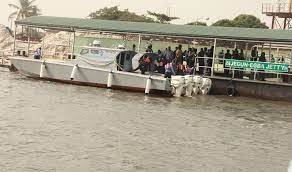
Shipping Position Daily has uncovered a deepening communal clash between a foreign-controlled group and local boat operators at the Ijegun-Egba Jetty in Lagos state. The festering acrimony has polarized control of water transportation services in the axis.
The local operators have alleged being sidelined, further intensifying the conflict, which has disrupted transportation and escalated tensions in the community.
The on-going dispute, our correspondent gathered stems from long-standing disagreements over territorial and business rights, with both sides asserting control over the increasingly valuable land. The jetty’s prime location, boosted by the growth of tourism in the area, has become a flashpoint for conflict, disrupting local services and leading to economic hardship and legal battles.
During visits to the jetty, our correspondent uncovered that a clash between residents of Ibeshe Beach and the indigenous Ibeshe community erupted following a disagreement over the burial of a deceased individual in March 2024. The altercation resulted in a significant loss of lives and property on both sides.
Local boat operators, mainly indigenes of Ibeshe, accuse the other group of being Ghanaians attempting to push them out of business. However, boat operators from the group in Lagos reject the label of being Ghanaians, claiming they are Nigerians with roots in Ile-Ife, Osun State.
Speaking to Shipping Position Daily, Comrade Kehinde Omotua, Secretary of the Ibeshe Zone of the Association of Tourist Boat Operators and Water Transporters of Nigeria (ATBOWATON), expressed concerns over the group’s rising dominance. Omotua claimed that the group, previously known as Agonyin, stopped using Ibeshe boats after a clash with local operators and started their own transportation business, acquiring five or six boats for their operations. This shift led to confrontations, forcing the matter into the hands of the Lagos State Waterways Authority (LASWA) and the National Inland Waterways Authority (NIWA), both of which licensed the group to operate.
“The group, whom we used to transport, have started their own service and now refuse to let us carry their passengers. This has greatly impacted our business,” Omotua lamented, noting that the conflict has worsened the economic hardship that local operators face. He added that the case is currently in court.
Mr Ayodele Lukman, Public Relations Officer of the Ibeshe Zone ATBOWATON, also highlighted how the clash erupted after an altercation over burial rites. Following the conflict, the group began operating their own boats, taking business away from ATBOWATON members. Lukman noted that many operators now face significant economic difficulties, with some, like himself, relying on other jobs to make ends meet.
On the other side, a boat operator from the group referred to as foreigners, named Joseph refuted claims that they are Ghanaians, asserting that they are Nigerians with roots in Ile-Ife. He argued that the local community started labeling them Ghanaians after the clash to discredit their efforts to establish their own business.
“We are not Ghanaians. We are Nigerians, and we have lived here for generations. The conflict arose when we sought to operate our own boats, and now they label us as outsiders to push us out of business,” Joseph said.
A beach operator at Ilashe who is familiar with the issue; Mr Andrew Eruaga, described the conflict as a deeply-rooted over the origins and rights of a particular tribe, who have settled in the coastal area for generations.
Eruaga said the violent clash erupted between a Yoruba tribal subset and the Ewe people in Ibeshe over land ownership disputes, fueled by growing interest in the area’s tourism and hospitality potential. He recounted a personal experience of the conflict’s impact, explaining how his formerly Yoruba boat driver switched to be identified as an Ewe driver following the clash.
“The lands are becoming highly lucrative, which has only intensified the dispute. From what I’ve gathered, the Ewe people are migratory coastal people, but the issue of their origins is hotly contested. The Yoruba sub-group insists that they are from Ghana, while the Ewe themselves assert that they are from Ile-Ife.” Eruaga said.















